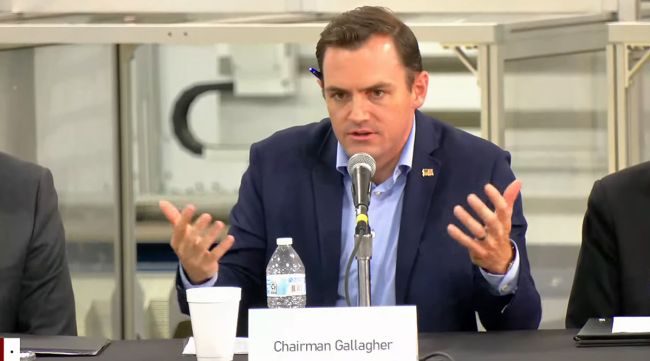A bipartisan group of lawmakers joined trucking industry stakeholders at a meeting hosted by a U.S. trailer manufacturer to dissect what they view as ongoing, unfair trade practices supported by the Chinese government that are hampering domestic manufacturing efforts. These include everything from stealing American technology to illegally subsidizing Chinese businesses competing with American companies, specifically those in the transportation sector.
“China heavily subsidizes their national champion industries,” Rep. Mike Gallagher (R-Wis.) said during a presentation at the meeting, hosted Aug. 30 by Wisconsin-based Stoughton Trailers at a manufacturing facility in its home state. “Our companies across America are competing against Chinese firms that cannot go bankrupt and cannot be underpriced.”
Pointing specifically to Stoughton, he said the company has been facing Chinese competitors that are “selling products into the U.S. for less than the cost of the raw materials used to produce them. That’s not competition, that’s an economic disease eating into our communities.”
Gallagher, Rep. Darin LaHood (R-Ill.) and Rep. Raja Krishnamoorthi (D-Ill.) are drafting legislation to slow China’s dominance in container and chassis manufacturing. The three congressmen, all members of the House Select Committee on the Chinese Communist Party, stress that allowing China to have global control of this industry is already a major economic issue, and could eventually pose a national security threat.
“One of the biggest challenges we have is the Chinese Communist Party,” Rep. Krishnamoorthi said. “China is not playing by the rules. They’ve created an environment where they regularly, unfairly have an advantage over their competitors. They steal intellectual property and they manipulate their currency and we have to stand up to them. We have to make this situation right.” The U.S. Commerce Department has confirmed that Chinese containers and chassis manufacturers are state-owned and they receive significant government subsidies.

Reps. LaHood and Krishnamoorthi of Illinois are joining Gallagher in drafting legislation to slow China’s dominance in container and chassis manufacturing. (House Select Committee on the Chinese Communist Party via youtube.com)
Stoughton Trailers President and CEO Bob Wahlin told Transport Topics that the challenge extends far beyond the walls of the factory where the event was held. “It goes well beyond Stoughton to the bigger threat that China is creating for the entire U.S. manufacturing base,” he said. “China has set out to be the dominant global manufacturer. But regarding chassis, China no longer has a monopoly.”

Wahlin from House Select Committee on the Chinese Communist Party via youtube.com
Wahlin noted that his company has dramatically expanded chassis production in recent years by opening a new plant in Waco, Texas, and by adding additional workers there and in Wisconsin.
In a March 2022 report, Federal Maritime Commissioner Carl Bentzel detailed what the agency said was China’s dominance in the chassis and container industry, noting that three Chinese manufacturers control 86% of the world’s supply of intermodal chassis and more than 95% of the shipping containers. He alleged that as demand for these products rose during the pandemic, Chinese manufacturers appeared to have taken part in a deliberate effort to spike prices by slowing production.
“The global supply chain is too interdependent not to have broad access and manufacturing capabilities for intermodal operational equipment,” Commissioner Bentzel wrote in his report. “The United States should assess whether given market dominance that further trade action be contemplated.”
In 2020, the United States International Trade Commission determined there was “a reasonable indication” that U.S. trailer manufacturers were “materially injured” by the import of container chassis that are allegedly subsidized by the government of China and sold in the U.S. at “less than fair value.”
“The thing that the [Chinese Communist Party] fears the most is bipartisan support against them, and this committee has worked for the last eight months to lay out that framework,” LaHood said, pointing out that more than 100 Democrats supported the formation of the Select Committee earlier this year.
The meeting itself brought the bipartisan lawmakers together with business leaders and union officials who are united by a desire to level the playing field when it comes to trade with China.

Kramer from House Select Committee on the Chinese Communist Party via youtube.com
“I see the real-world impact of anti-competitive [practices] done by companies based in China,” United Steelworkers Union Local 9777 President Steven Kramer said at the meeting. “Our elected leaders need to do more to foster domestic manufacturing with smart, targeted trade enforcements that defend American workers from illegal subsidies from anti-competitive practices. I’ve visited manufacturing plants every day and I know that our workers can and do outperform anyone in the world.”
Even with a downturn in freight volume, demand in trucking for new chassis has remained high, especially as companies are demanding newer equipment with standard features such as LED lighting, anti-lock braking systems and higher performing tires.
Stoughton’s Wahlin told the congressmen that the 2,300 workers at his 62-year-old, family-owned business are anxious to compete against the Chinese businesses head-to-head.
“We believe American workers and American products are the best in the world, our trailers can stand up against any competitor when we have a level playing field,” Wahlin said. “But we cannot compete against the full weight of the government of China. We urge the Select Committee to investigate the CCP’s subsidies further and advocate for counteracting measures.”






